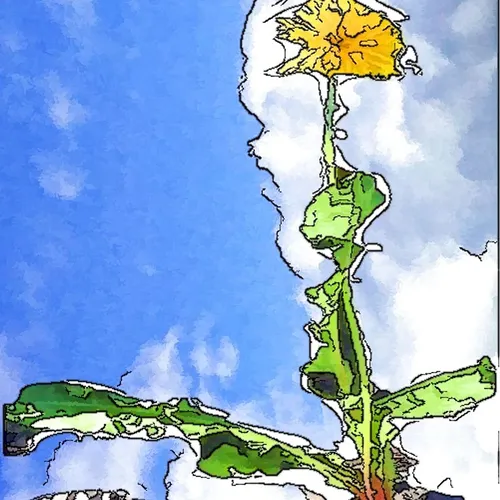
Conflict Owner's Manual
We help you use conflict competencies you already have, so you can do conflict better.
Dr. Deborah Sword is a specialist in conflict analysis and management. Tyson Bankert is a community facilitator and artist. We have decades of experience and training in helping people expand their conflict competencies.
Our logo is a dandelion because conflict is like a weed you don't want in the garden. But since it's there, you want to know how to manage it, keep it from spreading, and feel good about how you dealt with it.
- Update frequency
- every 3 days
- Average duration
- 6 minutes
- Episodes
- 96
- Years Active
- 2024 - 2025

57 What conflict competencies help overcome biased thinking?
A bias can make decisions easier. You don't have to think hard if you already know your bias for herbal tea and against caffeinated tea. But when biases cause conflict, or stop you from enjoying the …

56 What's the disconnect between your intention and the impact?
Have you made a comment that you intended as helpful and been criticized rather than thanked? Depending on how you respond in the situation, the cycle of defensive reaction either escalates or is dif…

55 How do you express vulnerability in your conflicts?
You have choices about how and when you let the person you're in conflict with know that you're feeling vulnerable. Since your sense of your vulnerability influences the decisions you make in conflic…

54 What's on your conflict mental map?
Everyone has a mental map of what conflict does or should look like, how it unfolds, and your ideal ending. Not everything on your conflict mental map is conflict competent. What may be on your confl…

53 How shame impacts your conflict competence
Feeling shame doesn't leave you much room for dealing with conflict. Shame fills a lot of space, crowding out empathy and perspective taking. How can you be conflict competent when you're beating up …

52 When conflict competence doesn't 'work' for you
Have you taken a conflict course and then not used what you learned? Here's what you're missing when you have the knowledge and don't use it regularly.
Send us a text. We love hearing from you.
Dr. Deb…

51 Four benefits of doing the work to be more conflict competent
Maya Angelou said, “I've learned that people will forget what you said, people will forget what you did, but people will never forget how you made them feel.” Pretend you have a private studio audien…

50 What you miss when you respond the same to every conflict
You may be comfortable avoiding conflict, which is one of the many responses available to you in conflicts. Avoiding would be your pattern and it can work well. Similarly, you may regularly default t…

49 What to do with conflicts stuck in past experiences, present anxieties, or future fears
The words people use can provide insights into what keeps a conflict going. It's a conflict competency to notice the past, present or future tense of words, including your own. Listen to people's wor…

48 The difference between presenting issues and real issues in conflict
Perhaps you know how to say what you want as an 'I message' rather than a 'you message' to avoid antagonizing the other person. I suggest additional strategies that deepen conversations and also go b…

47 Train your brain for conflict competence
Your brain uses your senses to collect data, interpret the information, make a risk assessment, and report to you at the speed of thought. Your brain predicts what is happening, and what might happen…

46 How to decide whether to engage in, ignore or avoid conflict
Your values and many other factors influence your decision to engage with conflict, how you engage, or if you won't engage. You have more choices than you know. In making your decisions, ask yourself…

45 How empathy mapping builds conflict competence
When you understand another person, conversations can flow. Perhaps you've heard the expression: 'meet people where they are' and wondered how to do that. We describe empathy mapping and conversation…

44 How to fix talking past each other
Some conversations just miss; you aren't on the same wavelength, no one seems to listen, and you feel verbally attacked. There are two conflict competence skills that get those heated debates back on…

43 What conflict competent tools deal with bullies?
Bullies exert power over someone, perhaps to achieve a goal, and perhaps that goal is simple intimidation for selfish rewards. The bully's target has little control over an uneven and unfair conflic…

42 How assumptions, beliefs and intentions interact in conflicts
Intentions are invisible. We predict and assume what someone intends, and then act as if what we believe is true. Game on for conflict. There are conflict competent approaches to clarifying someone's…

41 How to be conflict competent when provoked
There are many common statements that trigger conflict. We give strategies for how you can respond when someone pushes your buttons.
Send us a text. We love hearing from you.
Dr. Deborah Sword is a con…

40 Are any ghosts haunting your conflict?
If someone is trying to insert themselves into your conflict, they're like a conflict ghost. They aren't parties to the conflict, but they want to influence it anyway. Here are suggestions for confli…

39 Why you might be reluctant to apologize
Is there a downside to apologizing? What if your apology isn't accepted? We discuss the conflict competence you gain when you take a chance to offer an apology.

38 What's more effective than calling out someone you disagree with?
It's fast and easy to call out someone for an opinion or action, but is it effective? There are more conflict competent and effective steps than calling out. Deborah recommends Dr. Loretta Ross's new…